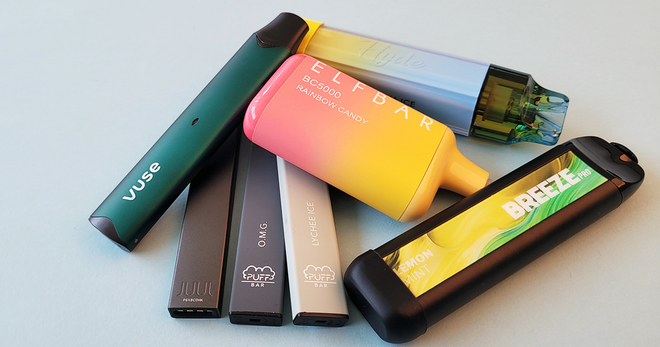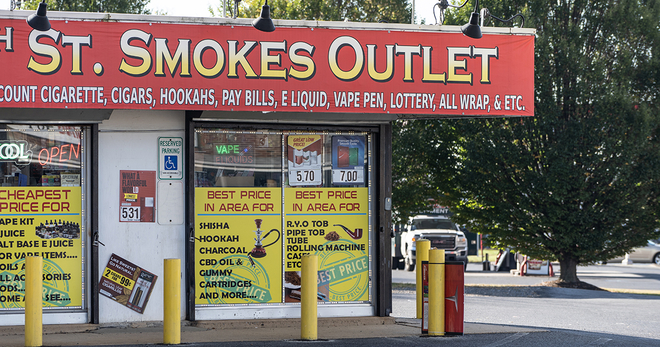Vape shops respond to tightening e-cigarette regulations with more online marketing and expansion to CBD products
Vape shops are expanding their product lines to include cannabidiol (CBD) products and building up their online marketing in response to tightening restrictions on e-cigarettes, according to new research led by George Washington University in collaboration with Truth Initiative and published in the International Journal of Environmental Research and Public Health. The research provides a glimpse into the perspectives of vape shop owners and how the e-cigarette retail environment may adapt to evolving regulations – important information when considering future regulations on e-cigarette sales and marketing.
Nearly 20% of retail e-cigarette sales in 2019 were from tobacco specialty stores including “vape shops” that exclusively sell e-cigarettes or “smoke shops” that sell e-cigarettes as well as other tobacco products. Recent regulations raising the minimum legal sales age for e-cigarettes from 18 to 21 and federal, state, and local restrictions on flavored e-cigarettes have impacted e-cigarette sales in these stores. Researchers surveyed 60 owners or managers of tobacco specialty stores in Atlanta, Boston, Minneapolis, Oklahoma City, San Diego, and Seattle in 2021 to gain insights on the impact of restrictions on e-cigarette sales on marketing and sales strategies.
Online e-cigarette marketing on the rise
Researchers found that the majority of vape shop owners have a store website (65%), use social media for online promotion (71.7%), and offer online sales (26.7%). Online marketing, which research has found to be the fastest growing vape retail segment, is a critical component of the marketing strategy for vape retailers and its growth “reflects a global trend toward online e-cigarette marketing and sales,” the authors write.
Tobacco companies are increasingly advertising their products online and through social media, a space that is not as tightly regulated as print and tv ads and marked by the rise of influencers and paid content that is hard to distinguish from organic content. The rising popularity of online marketing of e-cigarettes warrants greater surveillance and regulation of online advertising practices to ensure that youth are not being exposed to ads for nicotine-containing products.
Enforcement of e-cigarette policies is critical
About 40% of vape shop owners and managers did not know or inaccurately reported whether state or local laws setting the minimum age to purchase tobacco to 21 or flavored e-cigarette sales restrictions were in effect before federal policies were implemented. The lack of knowledge highlights the need for public education for retailers and consumers to reduce confusion and improve e-cigarette policy implementation and enforcement.
Researchers also found that vape shop personnel were aware of enforcement of e-cigarette sales policies through heavy fines and inspections. Participants in cities like San Diego, where fines for violating underage sales laws were much higher, reported that consequences were severe compared to less severe in cities like Oklahoma City, where fines were about five times lower. Most participants also mentioned their experiences with inspections by the FDA or local authorities, or fears of fines or losing their retail license. Findings suggest that appropriate fines and enforcement are critical for regulations to achieve their intended effects.
Vape shops expand to offer CBD products
Among merchants surveyed, nearly three-quarters (73.3%) sold vape products containing CBD, a non-psychoactive component of the marijuana plant, and 80% sold other CBD products. Store owners also indicated that CBD products would continue to be an important component of their product offerings, a trend that suggests many merchants are expanding to CBD products in response to tightening restrictions on e-cigarettes. CBD products, including vaping products, as well as cannabis glassware, pipes, and accessories were cited as the products most likely to be offered next year, according to the study. In fact, during the COVID-19 pandemic, some merchants said their vendors suggested that retailers expand product offerings to include other tobacco products and CBD.
It is important to examine how the vape retail environment may adapt or evolve in response to constantly evolving regulation of e-cigarette, nicotine, and cannabis products, according to the authors, and understanding merchants’ perspectives on these regulations may have important implications for regulatory efforts. “These findings are critical to informing future surveillance of the e-cigarette retail environment, consumer behavior, and regulatory compliance,” the authors write.
More in tobacco industry marketing
Want support quitting? Join EX Program
By clicking JOIN, you agree to the Terms, Text Message Terms and Privacy Policy.
Msg&Data rates may apply; msgs are automated.


